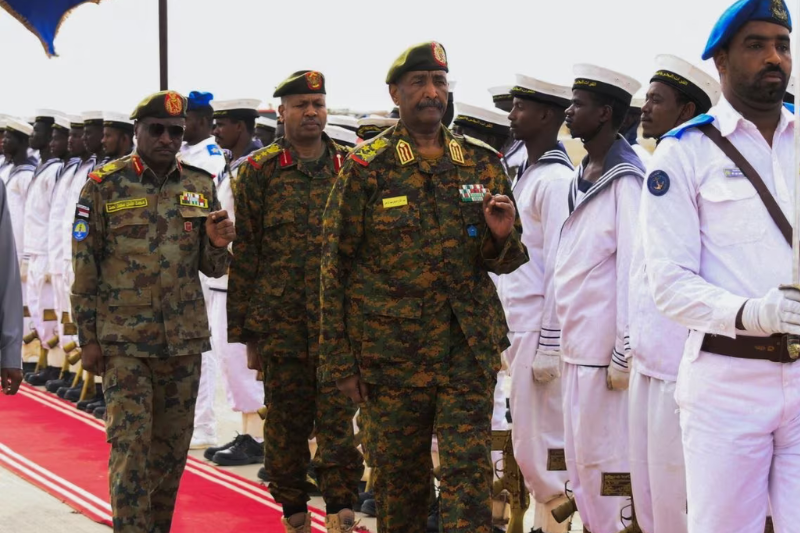On Thursday, the leader of the Sudanese armed forces, Abdel Fattah al-Burhan, traveled to Qatar to meet with the emir of that country. This was al-Burhan’s third trip outside of Sudan since the conflict began in April. He had already traveled to Egypt and South Sudan in recent days. Burhan, whose men are engaged in combat with the paramilitary Rapid Support Forces (RSF), had been under siege for a number of months inside the military headquarters in Khartoum. He remained in the war-torn country of Sudan until the end of August.
He received a red carpet welcome when he arrived in Doha, according to a statement from the Qatari royal palace, and spoke with the emir about “the most recent developments in the situation and challenges facing Sudan. According to the official Qatar News Agency, Burhan departed from Doha in the afternoon on Thursday.
The Armed Conflict Location and Event Data Project’s conservative estimate states that at least 5,000 people have died as a result of the conflict between Burhan and his former deputy, Mohamed Hamdan Daglo, the commander of the RSF. Burhan issued a proclamation late on Wednesday night disbanding the RSF, while the United States imposed penalties on senior commander Abdelrahim Hamdan Daglo, who is the brother of the paramilitary chief.
The Transitional Sovereignty Council, which Burhan chairs and issued the edict, explained that it was “based on the repercussions of these forces’ rebellion against the state, the grave violations they committed against citizens, and the deliberate sabotage of the country’s infrastructure.”
Human rights activists have accused the Rapid Support Force (RSF) and Arab militias with which it is affiliated of committing atrocities, including the rape, looting, and mass murdering of members of ethnic minorities, most notably in the region of Darfur, which is composed of multiple ethnic groups. The army has also been accused of human rights abuses, notably the indiscriminate bombing of civilian areas in which the RSF has a presence.
Burhan made his debut outside of army headquarters one month ago and has been traveling over the region, meeting with allies in recent weeks. Since fleeing the capital city of Khartoum, he has been residing in Port Sudan, a city in the east that has been protected from the conflict. The Sudanese government and the United Nations have both relocated their headquarters to the seaside city that is home to the country’s lone operational airport.
Keep Reading
Burhan traveled to Egypt, who has always been his closest friend, late in the month as rumors of negotiations aimed at resolving the conflict spread, and then this week he went to South Sudan. “The significance of the trips abroad is to confirm the legitimacy of Burhan with the international community,” Ashraf Abdulaziz, editor-in-chief of the independent Sudanese newspaper Al-Jarida, told AFP. “The significance of the trips abroad is to confirm the legitimacy of Burhan with the international community.”
After failed attempts at mediation in the early stages of the war, both Cairo and Juba have taken steps to mobilize regional and international efforts to put an end to the nearly five-month battle. The cease-fires that they mediated were repeatedly and methodically broken by both sides before the United States and Saudi Arabia halted peace negotiations in June.
Burhan has taken issue with the efforts of the East African group IGAD to mediate, accusing Kenya, the organization’s current coordinator, of providing a platform to Daglo in its endeavor to bring the warring sides to the bargaining table.
The Burhan administration boycotted peace negotiations that IGAD had arranged in Addis Abeba, the capital of Ethiopia, a month ago because they demanded Kenya’s removal. If Kenya continued to serve as the union’s chief negotiator, the Burhan regime’s foreign ministry went even further on Thursday and threatened to reevaluate Sudan’s membership in the group.
“If IGAD fails to heed our demand for a change of chairman (of its negotiating quartet),” the Sudanese government said in a statement, “the Sudanese government will review the relevance of its membership in this organization. In its announcement of penalties on Wednesday, the United States Treasury stated that under the leadership of Abdelrahim Hamdan Daglo, members of the RSF “have engaged in acts of violence and human rights abuses, including the massacre of civilians, ethnic killings, and the use of sexual violence.”
According to the report, most of the atrocities occurred in Darfur. In comments made on Thursday to Sky News Arabia, a television channel based in the United Arab Emirates that analysts claim has close ties to the RSF, Daglo referred to the penalties that have been imposed against him as “unfair. In addition, the United States State Department included Abdul Rahman Juma, the commander of the Relief and Security Forces in West Darfur, on its list of individuals to avoid due to what Washington referred to as “his involvement in a gross violation of human rights.”
Since April 15, the war has resulted in the deaths of thousands of people and has driven 4.8 million people from their homes; according to the United Nations, one million of these refugees have crossed international borders.

